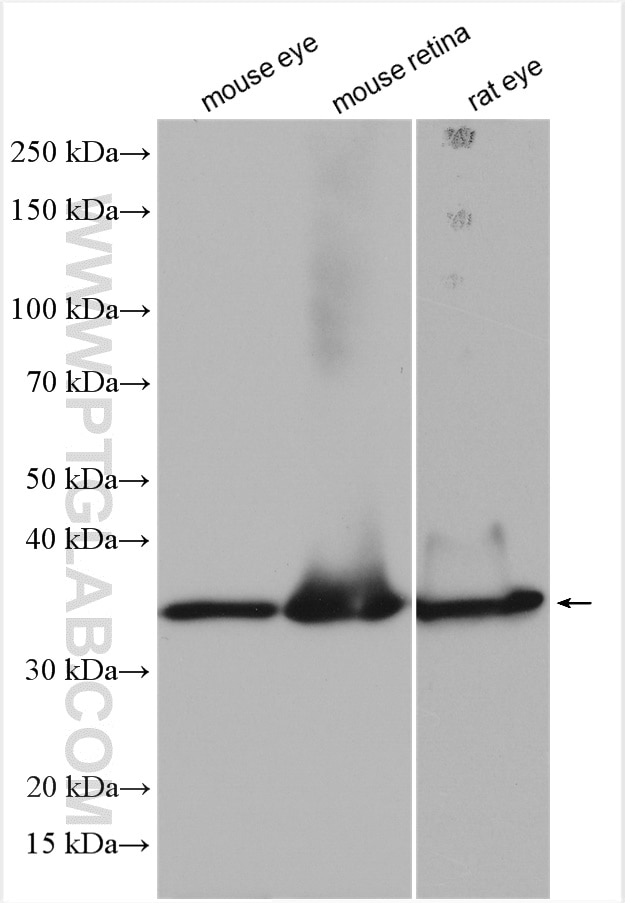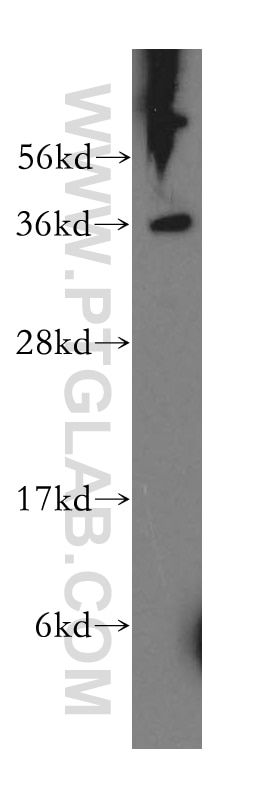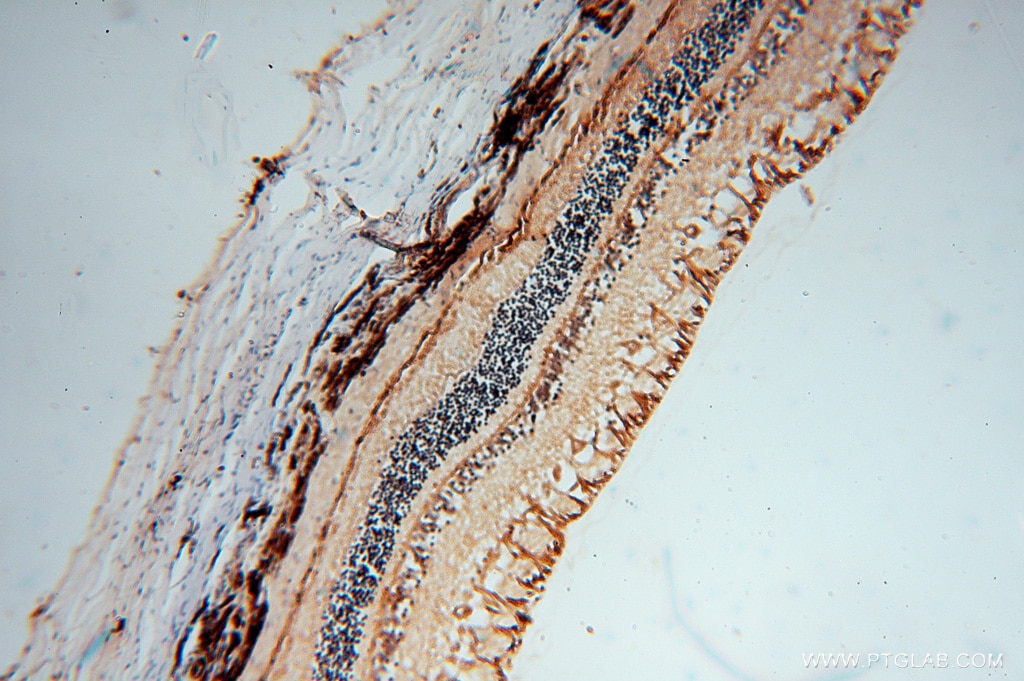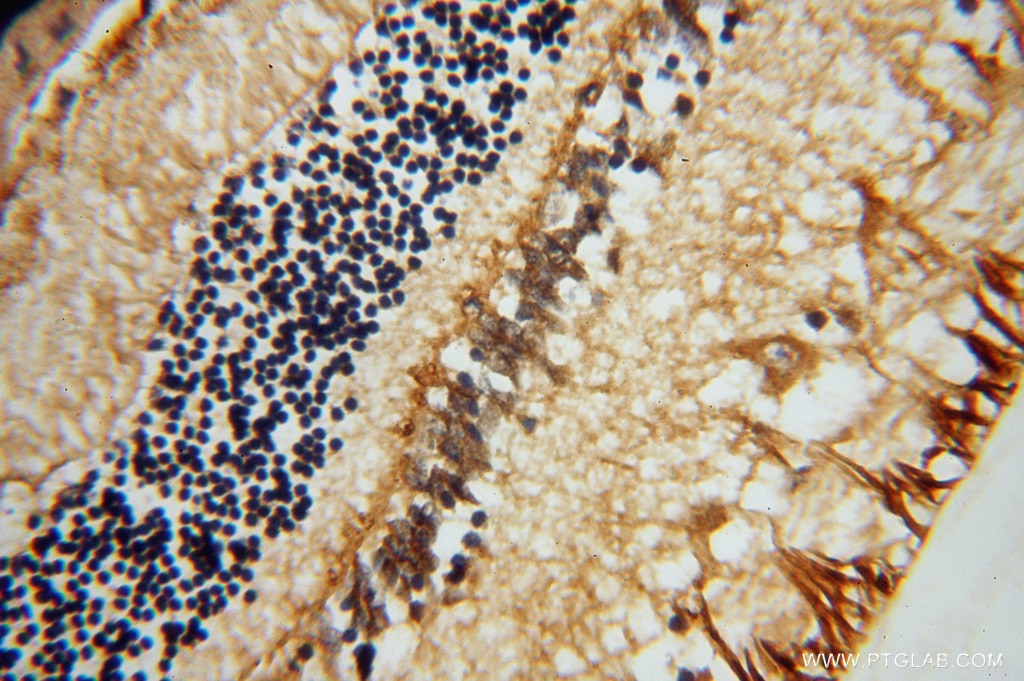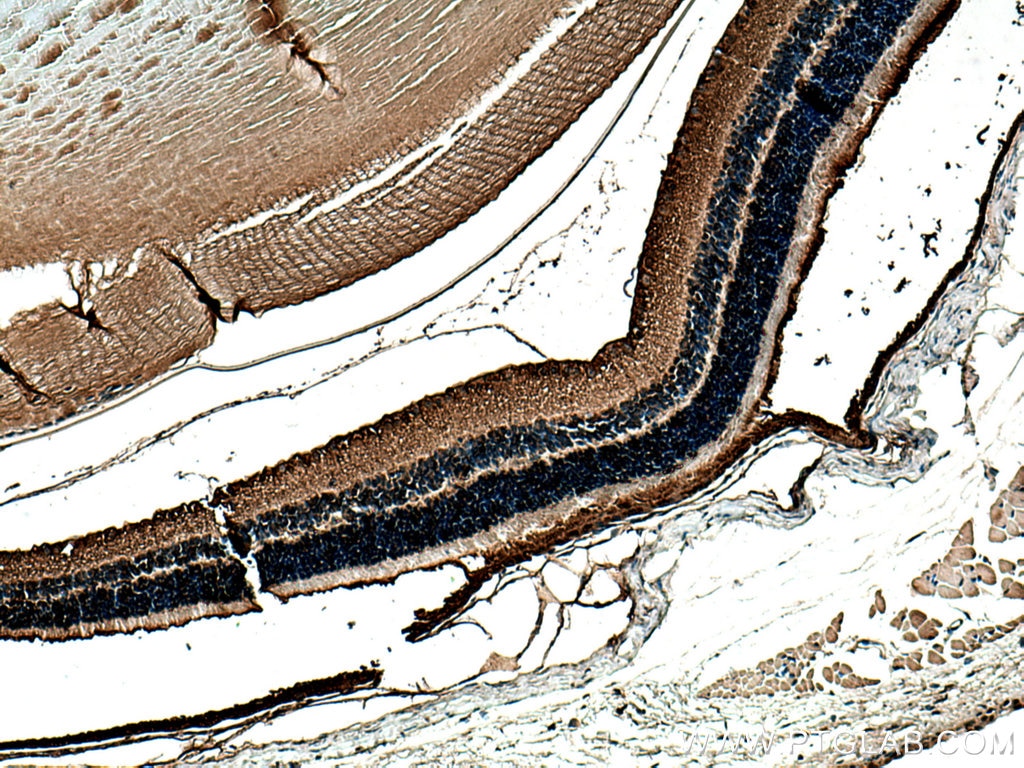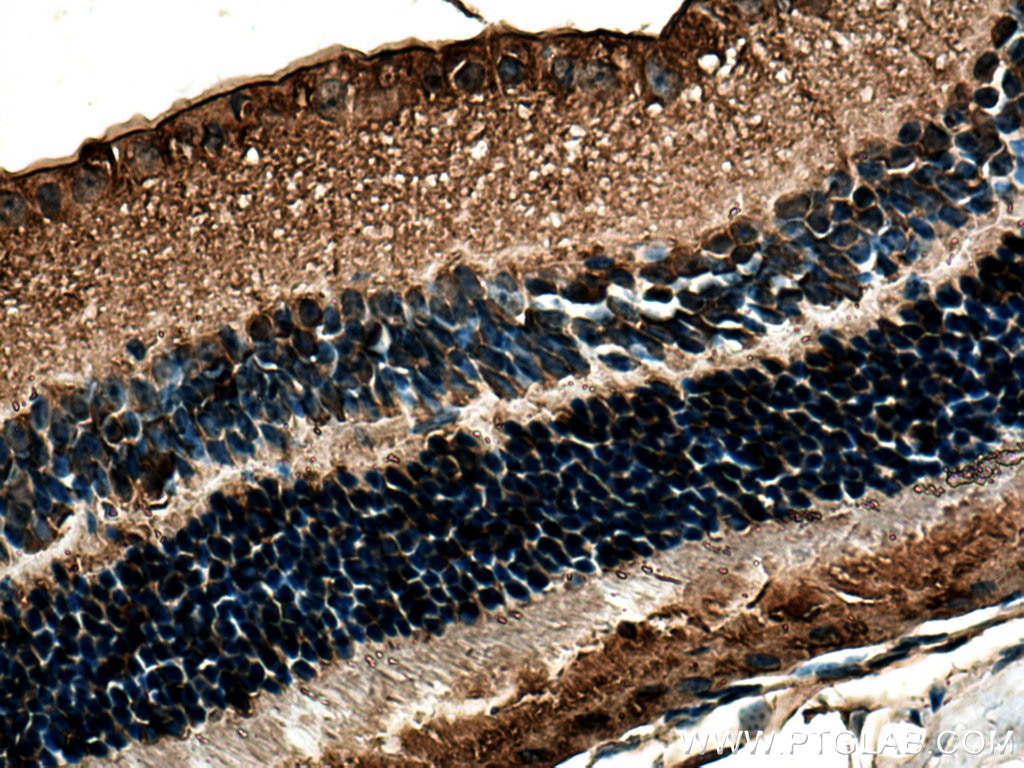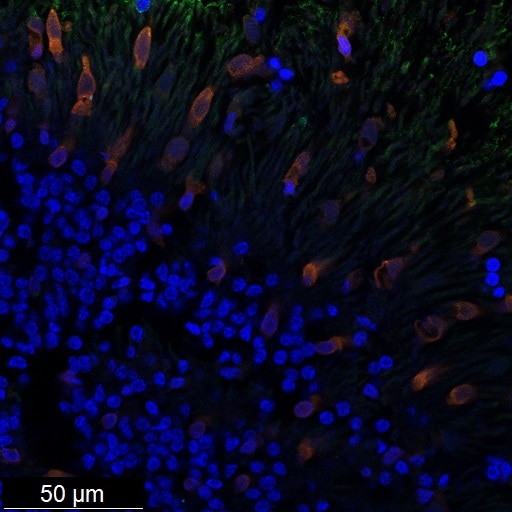RLBP1 Polyklonaler Antikörper
RLBP1 Polyklonal Antikörper für IF, IHC, WB, ELISA
Wirt / Isotyp
Kaninchen / IgG
Getestete Reaktivität
human, Maus, Ratte und mehr (1)
Anwendung
WB, IHC, IF, ELISA
Konjugation
Unkonjugiert
Kat-Nr. : 15356-1-AP
Synonyme
Galerie der Validierungsdaten
Geprüfte Anwendungen
| Erfolgreiche Detektion in WB | Maus-Augengewebe, HepG2-Zellen, Maus-Retina-Gewebe, Ratten-Augengewebe |
| Erfolgreiche Detektion in IHC | humanes Augengewebe, Maus-Augengewebe Hinweis: Antigendemaskierung mit TE-Puffer pH 9,0 empfohlen. (*) Wahlweise kann die Antigendemaskierung auch mit Citratpuffer pH 6,0 erfolgen. |
| Erfolgreiche Detektion in IF | Retinal organoids |
Empfohlene Verdünnung
| Anwendung | Verdünnung |
|---|---|
| Western Blot (WB) | WB : 1:500-1:2000 |
| Immunhistochemie (IHC) | IHC : 1:20-1:200 |
| Immunfluoreszenz (IF) | IF : 1:10-1:100 |
| It is recommended that this reagent should be titrated in each testing system to obtain optimal results. | |
| Sample-dependent, check data in validation data gallery | |
Veröffentlichte Anwendungen
| WB | See 4 publications below |
| IHC | See 2 publications below |
| IF | See 11 publications below |
Produktinformation
15356-1-AP bindet in WB, IHC, IF, ELISA RLBP1 und zeigt Reaktivität mit human, Maus, Ratten
| Getestete Reaktivität | human, Maus, Ratte |
| In Publikationen genannte Reaktivität | human, Maus, Ratte, Zebrafisch |
| Wirt / Isotyp | Kaninchen / IgG |
| Klonalität | Polyklonal |
| Typ | Antikörper |
| Immunogen | RLBP1 fusion protein Ag7602 |
| Vollständiger Name | retinaldehyde binding protein 1 |
| Berechnetes Molekulargewicht | 36 kDa |
| Beobachtetes Molekulargewicht | 36 kDa |
| GenBank-Zugangsnummer | BC004199 |
| Gene symbol | RLBP1 |
| Gene ID (NCBI) | 6017 |
| Konjugation | Unkonjugiert |
| Form | Liquid |
| Reinigungsmethode | Antigen-Affinitätsreinigung |
| Lagerungspuffer | PBS mit 0.02% Natriumazid und 50% Glycerin pH 7.3. |
| Lagerungsbedingungen | Bei -20°C lagern. Nach dem Versand ein Jahr lang stabil Aliquotieren ist bei -20oC Lagerung nicht notwendig. 20ul Größen enthalten 0,1% BSA. |
Protokolle
| Produktspezifische Protokolle | |
|---|---|
| WB protocol for RLBP1 antibody 15356-1-AP | Protokoll herunterladen |
| IHC protocol for RLBP1 antibody 15356-1-AP | Protokoll herunterladen |
| Standard-Protokolle | |
|---|---|
| Klicken Sie hier, um unsere Standardprotokolle anzuzeigen |
Publikationen
| Species | Application | Title |
|---|---|---|
Aging Cell Müller Glia maintain their regenerative potential despite degeneration in the aged zebrafish retina. | ||
Mol Vis Morphological, biochemical, and transcriptomic characterization of iPSC-derived human RPE cells from normal and Smith-Lemli-Opitz syndrome patients | ||
Diabetes CD40 in Retinal Müller Cells Induces P2X7-Dependent Cytokine Expression in Macrophages/Microglia in Diabetic Mice and Development of Early Experimental Diabetic Retinopathy. | ||
FASEB J A cell-penetrating CD40-TRAF2,3 blocking peptide diminishes inflammation and neuronal loss after ischemia/reperfusion. | ||
iScience Induced retinal pigment epithelial cells with anti-epithelial-to-mesenchymal transition ability delay retinal degeneration | ||
Invest Ophthalmol Vis Sci CD40 Upregulation in the Retina of Patients With Diabetic Retinopathy: Association With TRAF2/TRAF6 Upregulation and Inflammatory Molecule Expression |
Rezensionen
The reviews below have been submitted by verified Proteintech customers who received an incentive forproviding their feedback.
FH Ryan (Verified Customer) (01-24-2018) | Antigen retrieval in NaCit 0.1M ph 6
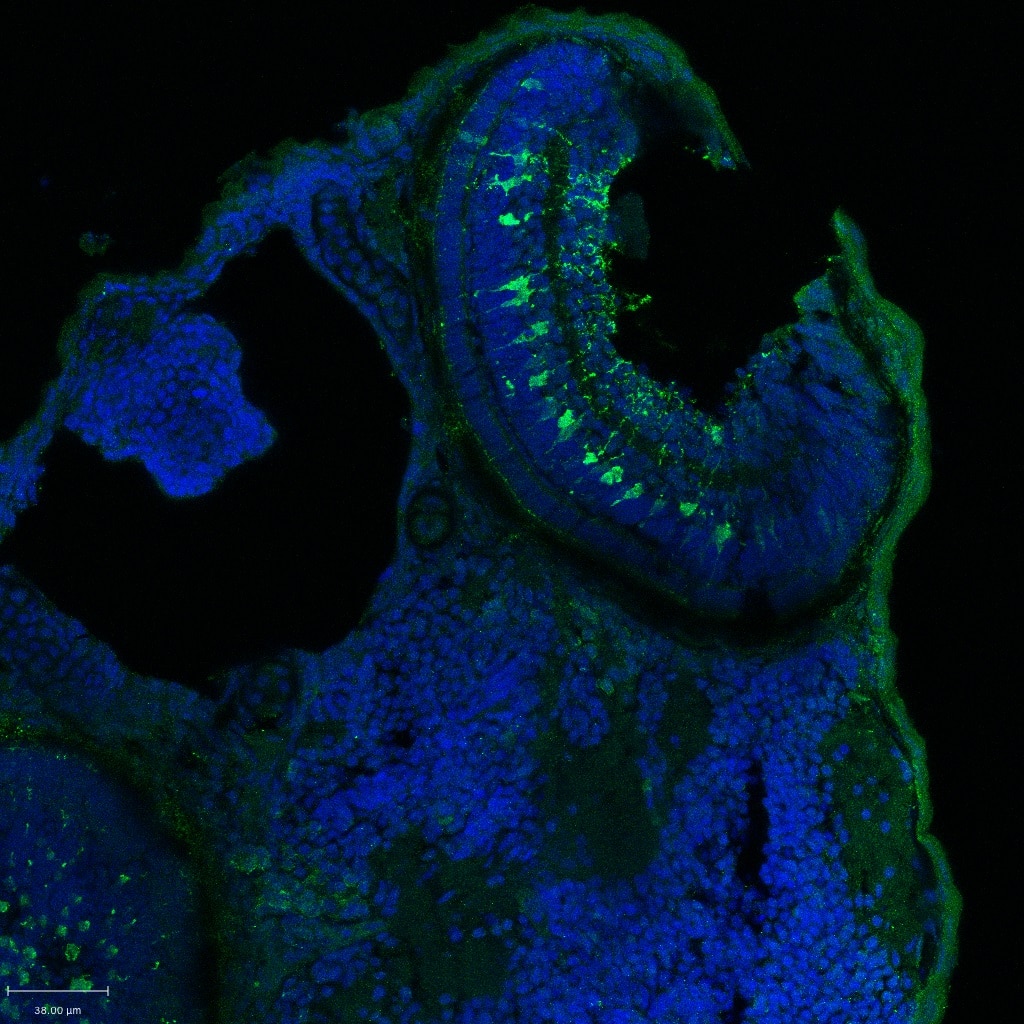 |
